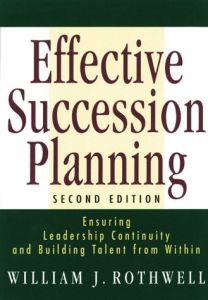Acesse a sua conta getAbstract para obter o resumo!

Acesse a sua conta getAbstract para obter o resumo!
William J. Rothwell
Effective Succession Planning
Ensuring Leadership Continuity and Building Talent from Within
AMACOM, 2001
Sobre o que é?
Don’t wait until your leaders leave to think about how you’ll replace them.
Recommendation
In exhaustive detail William J. Rothwell shows you the hows and whys of succession planning and management in this second edition of his landmark book. Given the general corporate predilection for systems and bureaucracies, top executives and managers of both large and small businesses will revel in the way Rothwell lays out his well-researched plan. His ample how-to lists and charts can be adapted to fit almost any industry. Despite the author’s scholarly credentials and depth of information, his writing is not academic. getAbstract.com recommends this book to executives and managers, particularly if your company doesn’t already have a succession plan.
Summary
About the Author
William J. Rothwell, Ph.D., is professor of human resources development at Pennsylvania State University and director of Penn State’s Institute for Research in Training and Development. The former assistant vice president and management development director for The Franklin Insurance Company, he is the author or co-author of numerous articles and books, including Beyond Training and Development, Strategic Human Resource Leader and The Action Learning Guidebook.




















Comment on this summary